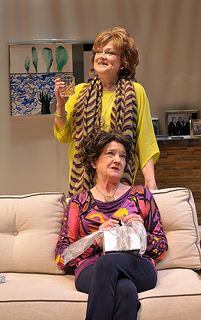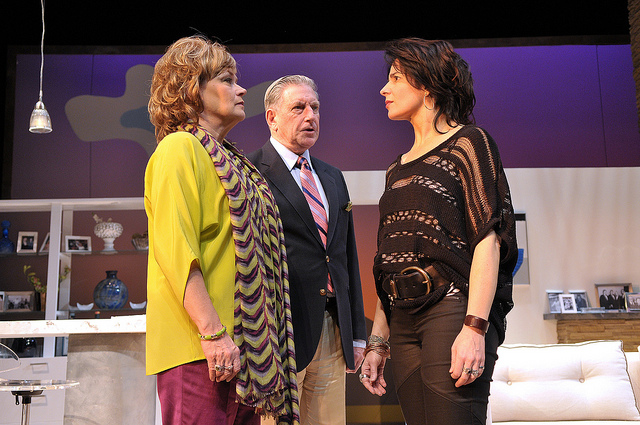Fuse Theater Review: “Other Desert Cities” — Bridging the Great Cultural Divide?
For all of its earnest interest in healing some of the great divides in American life, Other Desert Cities ends up slighting the desert spaces that lie between us.
Other Desert Cities by Jon Robin Baitz. Directed by Scott Edmiston. Set by Janie E. Howland. Costumes by Charles Schoonmaker. Lighting by Karen Perlow. Staged by SpeakEasy Stage. At Stanford Calderwood Pavilion at the Boston Center for the Arts, Boston, MA, through February 9.
By Bill Marx.

Karen MacDonald (top) and Nancy E. Carroll in the SpeakEasy Stage production of OTHER DESERT CITIES. Photo: Craig Bailey/Perspective Photo
Dramatist Jon Robin Baitz has his eye on Henrik Ibsen. In 1999, he adapted Hedda Gabler and now in his 2010 play Other Desert Cities, he spins a homegrown variation on The Wild Duck. Both plays feature a hell-bent (and flawed) truth-teller determined to push unflattering news into faces of a band of dreamers who are living “fake” lives based on lies and self-serving delusions. Ibsen, always uncompromising, took this crusade all the way to its magnificent tragicomic conclusion—God save us from the truth-tellers! Baitz, being an American and writing for the reality-adverse sensibilities of Broadway audiences, keeps his dramatic expose all in the family, which apparently gives him permission to stop short of pushing his exploration of cultural and internecine trauma to its outer limit. Among American playwrights, only Eugene O’Neill in Long Day’s Journey Into Night had the courage to take a long and hard look into the domestic abyss.
This is not to say that the generally well-acted SpeakEasy Stage production isn’t involving, particularly once the expository scenes are over with, though Baitz takes his time letting go of the sugary hand-rail.
Left-wing daughter Brooke Wyeth, a once promising novelist who has shakily survived bouts of depression and the breakup of her marriage, is visiting her wealthy, right-wing parents in Palm Springs, California. It is Christmas 2004, and her gift is a mysterious manuscript filled with uncomfortable revelations about the suicide of her older brother Henry, an antiwar activist. The book is not kind regarding her parents’ treatment of her disturbed sibling: they are heavy-duty Republicans (they mingled with Ron and Nancy) who had careers in film—Lyman as a minor action hero, Polly a screenwriter. (Cue laugh lines about show biz). Other family members tested by the tell-all book are Brooke’s amiable brother Trip, who produces a reality TV show (Cue jokes about schlock programming followed by an obligatory confession of deep self-loathing), and Silda, Polly’s alcoholic sister, who slings sharp zingers while alternately loping and collapsing around the house. (Early on, Polly and her sister’s Jewish background generates the usual Yiddish-y one-liners. Apparently, they still work on Broadway.)
Once the introductory chit-chat is over, Brooke hands the manuscript to Lyman, Polly, and Trip to read, and Other Desert Cities’ serving of buried traumas, repressed secrets, simmering culture wars, spiritual paralysis, and casual addiction ripens in pleasingly melodramatic ways. (There is more than a touch of Edward Albee’s A Delicate Balance here as well.) When is betrayal in the pursuit of the truth acceptable? Can anyone really arrive at an objective truth about family matters? What price loyality? What values transcend hardline political beliefs?
Baitz is effective at setting up startling (if not always believable) reversals, neatly flipping staid ideological assumptions, so your answers to these thorny questions tumble about nimbly. Lyman, Trip, and Silda wriggle in pain on the barbed hook of the memoir, while Brooke has a few things to learn about the value of humility. The mother/daughter confrontation takes center stage: both Polly and Brooke are propelled by the same unforgiving yet loving toughness, the same unyielding passion (martyr complexes?) to be true to Henry’s memory. His fate and its agonizing aftermath serve as a dark fable about the chaos of the counterculture and its enduring heritage of discontent.

Karen MacDonald, Munson Hicks, and Anne Gottlieb face off in the SpeakEasy Stage production of OTHER DESERT CITIES. Photo: Craig Bailey/Perspective Photo.
The SpeakEasy Stage cast members give sensitive performances, making more of the script’s comedy than its angst. Munson Hicks, as Lyman, wavers skillfully between passive acceptance and active anguish, while Anne Gottlieb turns Brooke’s tortured ambivalence into an affecting portrait of a half-hearted revenge fantasy. Nancy E. Carroll does well with the stereotypical role of the unhinged-outsider who speaks what she sees as honestly embarrassing truths. As the iron-willed matriarch, Polly, Karen MacDonald gives an adroit performance, mixing humane concern with brassy defiance. Sometimes the actress could use more steeliness—her intransigence is more deep-seated than Brooke’s wavering stab at independence. Christopher Smith gives a nice edge of anxiety to the diplomatic Trip, who is frustrated with trying to please both sides. Janie Howland’s set feels appropriately lost in time, and Scott Edmiston’s direction is agile and generally well-paced, though the early scenes could be tighter—usually I am not so anxious to have a script cut to the chase.
Unfortunately, by the end of the chase, Baitz backs off into sentimentality, embracing the standard recourse of the American therapeutic. The dramatist is not, as the Boston Globe reviewer would have it, courageously going beyond the automatic hissy-fit face-off between Fox and MSNBC: there is nothing in the script that would offend either ideological constituency. Instead, Baitz chooses to give leave the audience with easy pathos rather than challenging its deep-seated assumptions, perhaps because he is confusing cynicism with tragedy.
Other Desert Cities wants to cauterize the wounds (of a dysfunctional family, of American political trauma) before it completely diagnoses the depths of the damage: it is not exploitative (or counterproductive) to dramatize reality by probing deeply into the gulf between combatants and the consequences of their actions. For all of its earnest interest in healing some of the great divides in American life, as well as its considerable dramatic ambition and heft, Other Desert Cities ends up slighting the desert spaces that lie between us.
See Peter Adrian-Cohen’s Fuse review of Other Desert Cities.
